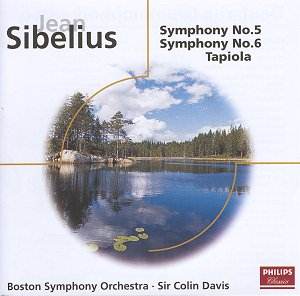Now that Sir Colin Davis’s later RCA digital set of
the Sibelius symphonies with the London Symphony Orchestra is being
re-released at mid-price, his earlier Philips analogue set with the
Boston Symphony Orchestra is being offered at throw-away prices. And
make no mistake: you get well-planned couplings, well-filled discs and
performances which (with a few trifling exceptions) are as revealing
as any.
I suppose it’s tempting to talk of a Sibelius ‘tradition’
at Boston, chiefly on account of Koussevitsky’s time there before the
war. But that was a long time ago – it’s most unlikely, I suppose, that
any of Koussevitsky’s players played in these Davis recordings! – and
none of Munch, Leinsdorf or Ozawa seems to have had a particular empathy
with Sibelius. Even so, you have to admit that the orchestra sounds
as if this music is in their blood: it’s impressively sure-footed playing,
and strikingly idiomatic in both colour and character.
The differences between these 1970s recordings and
those Davis made in the late 1990s are subtle, and generally concern
matters of detail. If anything, the later versions are tauter, more
spontaneous: in most cases, they are distinguished by a stronger sense
of overview, but without ever sacrificing attention to detail. However,
the earlier readings are in the main exceptionally fine, and remain
competitive.
By common consent, the Fifth was not typical of the
best of the Boston cycle: for all its many excellent qualities, it’s
a rather studied reading compared with the more atmospheric LSO version.
Although the recording sounds well in a number of ways, the lack of
space (of ‘air’ in the studio) may be said to rob the music of its ability
to ‘speak’, or to evoke the extra-musical imagery I know many listeners
enjoy in this music.
The Sixth was recorded at a later session and is, by
any standards, superb: the string playing in the all-important opening
pages is sumptuous, and the sense of organic growth throughout is compelling.
The LSO/RCA version may be more expansive, but it is no more persuasive.
As you would expect from a charismatic conductor like
Davis, Tapiola is both powerful and evocative. However, the rather
close balance of the strings, with winds placed well behind, means that
some orchestral detail is less clear than it might be. By comparison,
Ashkenazy’s Kingsway Hall recording for Decca (his is an obvious rival
at this price, and it’s digital) is more open, spacious and resonant:
inevitably, the music has more impact, and even more atmosphere.
These are recommendable versions, then, but there are
better available. An irritating point on which to end: there are no
notes whatsoever, just ‘trailers’ for other Philips Classics and Eloquence
releases – this really is inexcusable!
Peter J Lawson


